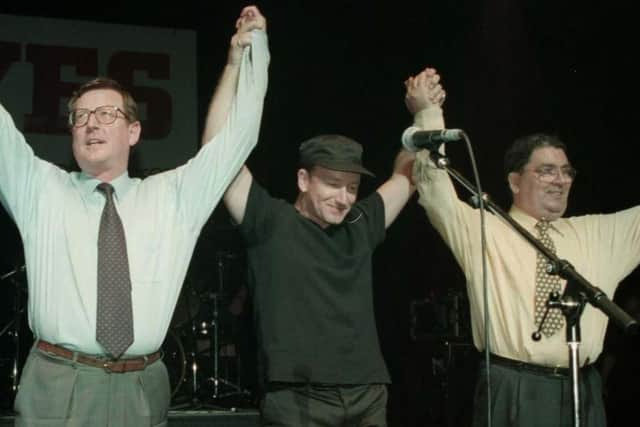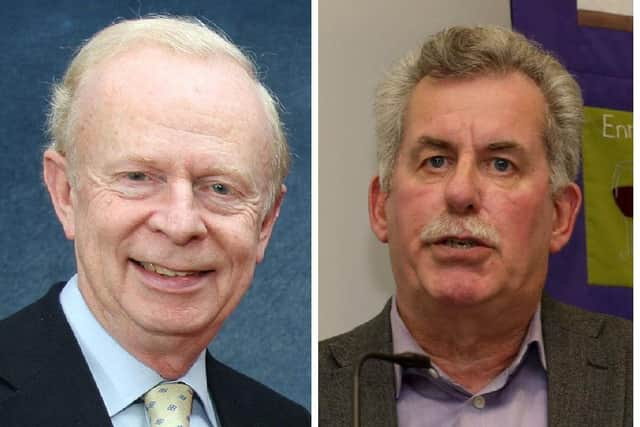‘DUP-Sinn Fein tinkering with Good Friday Agreement has caused surge in ‘sectarian headcount’ elections’, say members of SDLP and UUP talks teams which secured the 1998 deal
and live on Freeview channel 276
UUP peer Lord Reg Empey and former SDLP MLA Alban Maginness - both members of their party talks teams in 1998, were speaking after the resignation of First Minister Paul Givan triggered the automatic removal of Sinn Fein’s Deputy First Minister Michelle O’Neill and the wind up of the assembly ahead of the May 5 election. The process has intensified an ongoing heated debate about which party is most likely to secure the First Minister’s position.
But Lord Empey says the debate would never even have arisen if the DUP and Sinn Fein had not amended the legislative basis of the Belfast Agreement (Good Friday Agreement), which he says they both did in the legislative version of the St Andrew’s Agreement in 2006/7.
Advertisement
Hide AdAdvertisement
Hide AdBoth he and Mr Maginness say the DUP and Sinn Fein tweaked the Belfast Agreement so that Ian Paisley and Martin McGuinness did not have to be presented to MLAs on a joint ticket for approval in an assembly vote.


Furthermore, the changes meant that the First Minister would no longer necessarily come from the community with most MLAs, whether unionist or nationalist, but rather from the largest single party.
As a result, both men say that the legislaltive change means that every election since has degenerated into a “sectarian headcount” or “ethno-nationalistic” battle for domination.
Asked by the News Letter why politics has become so ill tempered since the days of David Trimble and John Hume with rock star Bono holding their arms aloft, Lord Reg Empey and former SDLP MLA Alban Maginness both came to the same conclusion, totally independently of each other.
Advertisement
Hide AdAdvertisement
Hide AdBoth of them blamed DUP-Sinn Fein tinkering with the Good Friday Agreement - a deal driven by the UUP and SDLP - by means of the St Andrew’s Agreement in 2006/7. Both said the DUP-Sinn Fein tinkering seriously damaged the partnership ethos of the 1998 deal, as envisioned by its UUP and SDLP architects.


Lord Empey said: “What has happened is that the agreement that we negotiated [in 1998] was changed.”
He said this was done in 2006/7 in the legislation based on the St Andrew’s agreement.
“Under our proposals that we had ratified [in 1998], the largest party in the largest designation, i.e. unionist or nationalist, would provide the First Minister and the largest party in the second largest designation would be the deputy First Minister. Two names then went before the assembly on a single resolution to be elected by the assembly in a cross community vote. But that was changed to suit Paisley and McGuinness.”
Advertisement
Hide AdAdvertisement
Hide AdHe claims Paisley did not want to be seen on a joint resolution with former IRA commander Martin McGuinness and that McGuinness did not want to be subject to a unionist veto, due to his paramilitary past. And this, he believes, this is at the root of the tensions today.
“It has completely changed the way the whole way devolution operates. The tenor of election manifestos changed after that with a major focus on keeping the other party out or securing First Minister for Sinn Fein.”
He added that under the original legislation, “there would be no question of Sinn Fein being first minister because there would be more pro-union MLAs than nationalist MLAs.”
But his criticism does not simply extend back to 2006/7.
“The DUP has also been resisting attempts in Parliament that we have been making in the last number of months and weeks to try and change the legislation back to the original proposal.”
Advertisement
Hide AdAdvertisement
Hide AdFormer SDLP MLA Alban Maginnis agreed the tone of politics has declined.
“It is both polarised and rancorous but there is a degree of rancour which should not be there given the elapse of some 20 years since the GFA.”
John Hume wanted “power sharing... partnership between nationalists and unionists in the new assembly and the new executive and indeed between north and south.”
This had started to blossom, he said. “But then the radical changes that took place in terms of voting and so forth in 2007 [in the St Andrews Agreement].”
Advertisement
Hide AdAdvertisement
Hide Ad“And that I think led to a more polarised electoral race between Sinn Fein and the DUP.”
He terms the DUP and Sinn Fein “ethno-nationalist blocs” whereas the UUP and SDLP he terms “civic nationalist parties”.
He believes both David Trimble and John Hume made major sacrifices, even in terms of their own parties, to secure the Belfast Agreement.
“They were selfless in their approach. They wanted a settlement, they wanted to solve problems, they wanted to bring their communities together in terms of partnership and there were people there who didn’t want that to happen, particularly the DUP and Sinn Fein.”
Advertisement
Hide AdAdvertisement
Hide AdHe accepts that Ian Paisley, Martin McGuinness and Peter Robinson all worked together well in the top two jobs, but says the DUP and Sinn Fein grassroots were not supportive.
Asked if he thinks “ethnonationalism” needs a “bogeyman” in order to function, he claimed: “Ethnonationalism sees itself in a struggle to defend itself and its political community and it is therefore constantly being defensive and at the same time trying to assert its dominance one over the other. I think that is the problem.”
The News Letter asked the DUP and Sinn Fein why they changed the means of electing the First and Deputy First Minister - and why they didn’t back recent efforts to change it back again. The News Letter also asked if they prefer the St Andrew’s arrangements because they believe it will better motivate their voters to turn out?
The DUP response did not address any of the questions.
Fermanagh & South Tyrone MLA Deborah Erskine responded: “A SF win at the election would take Northern Ireland in the wrong direction. They would have more MLAs, more Ministers and more influence than any other party. That would be bad for Northern Ireland. We want to spend the next decade fixing our health service, driving down waiting times, improving our schools and making Northern Ireland better. SF want to spend the next decade undermining Northern Ireland and talking about a border poll.
Advertisement
Hide AdAdvertisement
Hide Ad“Unionism needs to stand together rather than attack each other. Reg just cant help himself attacking fellow unionists.”
Sinn Fein offered no response.
MORE NEWS:
Advertisement
Hide AdAdvertisement
Hide AdA message from the Editor:
Thank you for reading this story on our website. While I have your attention, I also have an important request to make of you.
With the coronavirus lockdown having a major impact on many of our advertisers - and consequently the revenue we receive - we are more reliant than ever on you taking out a digital subscription.
Subscribe to newsletter.co.uk and enjoy unlimited access to the best Northern Ireland and UK news and information online and on our app. With a digital subscription, you can read more than 5 articles, see fewer ads, enjoy faster load times, and get access to exclusive newsletters and content. Visit https://www.newsletter.co.uk/subscriptions now to sign up.
Advertisement
Hide AdAdvertisement
Hide AdOur journalism costs money and we rely on advertising, print and digital revenues to help to support them. By supporting us, we are able to support you in providing trusted, fact-checked content for this website.
Ben Lowry
Editor